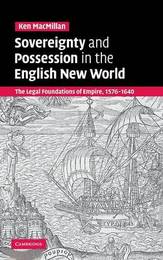
|
Sovereignty and Possession in the English New World: The Legal Foundations of Empire, 1576-1640
Hardback
Main Details
Description
How did contemporary English and European notions of sovereignty, empire, law and state formation impact upon English methods of settlement and governance in the Americas? Using documents such as travel narratives, promotional literature, colonial charters, maps, diplomatic correspondence and state papers, Ken MacMillan offers a major new study of legal imperialism under Queen Elizabeth and the early Stuarts. He argues that the imperial centre had a legal and historical right and responsibility to supervise its colonial peripheries. By drawing on legal resources associated with Roman law and the law of nations, the crown and its agents ensured that English New World claims would gain recognition in the broader European community, thereby establishing legal foundations that would have an enduring impact on the British Empire. The book will appeal to scholars in imperial studies, English and American legal and constitutional history, foreign affairs and the history of international law.
Author Biography
Ken MacMillan is Assistant Professor of History at the University of Calgary. He is the editor of John Dee: The Limits of the British Empire (2004).
Reviews"...a tightly focused and clearly argued exploration of the early English legal justifications for why England, rather than Spain, France, or anyone else, had the right to claim the parts of North America that would become English colonies.' Law and History Review
|